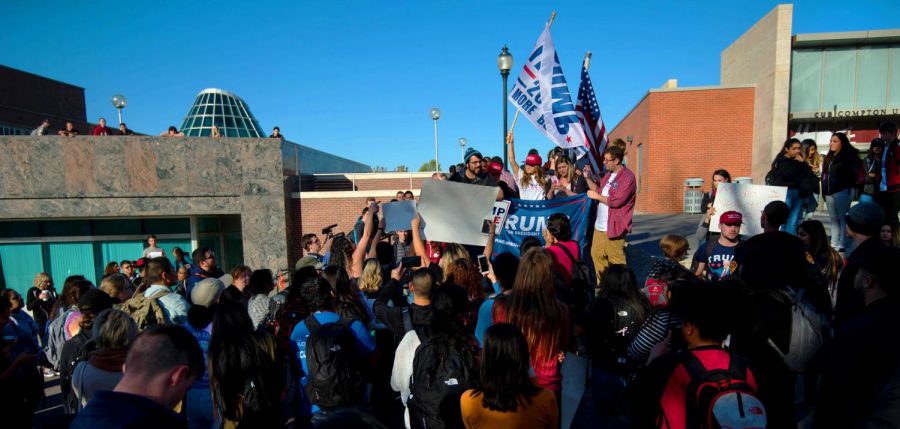Identity politics promote tribalist parties, isolates minorities
Identifying wholly with one trait promotes an unrealistic worldview, reinforces propaganda
LUKE HOLLISTER | DAILY EVERGREEN FILE
Counter-protesters surround and chant against students supporting Trump following the 2016 U.S. presidential election. Identity politics can limit a person’s ability to compromise and engage with opposition in meaningful dialogue.
September 11, 2018
Identity politics segregates minority groups and individuals who don’t have a strong national identity are more easily influenced by political propaganda that continues promoting identity groups.
Let’s face it, we are all born into a world of circumstances we don’t control. Some of us are born into wealth, never worrying about money; some poor, never experiencing the luxuries of their counterparts.
Some people grew up in two-parent households, some in one and others never knowing anything but the foster care system.
Privilege exists with everyone in some capacity, but there isn’t one single defining feature or factor that makes someone exclusively inclined to succeed in modern America, least of all race.
However, I’d be negligent if I didn’t acknowledge the atrocities of America’s history of race-based discrimination and prejudice. But equating institutionalized discrimination of the pre-1960s with the climate of America today is nonsensical.
As an African-American male lucky enough to live in a country where I get paid to write my political opinions, I think you’d be hard-pressed to assume my race drastically disadvantages me in any implicit way.
Herein lies the issue of identity politics.
This political scheme vocalizes equality through inequity and advocates the recognition of singular group traits in order to perpetuate the view of continued victimization. It fights white supremacy with black nationalism and distinctions between genders with anti-masculine campaigns.
Subscribing to this hostile environment induces separation of individuals by promoting avoidance from opposing groups.
But this wasn’t always the climate of America or our politics.
“We basically look to government to protect us from a variety of harms,” said Michael Salamone, a WSU judicial process professor. “That’s not specific to any ideology and we can disagree on what those harms are and what the solutions are, but both left and right believe this.”
The chief principled idea of America above party politics has always been that you should be the architect of your own future.
This basic perspective of government has stood long before any substantive promise or campaign promoted the preservation of your political freedom, economic freedom or basic human rights granted by the Constitution.
“When I think of American exceptionalism I don’t necessarily think of it in that normative sense where exceptional means the best. I think of it as exceptional means different,” Salamone said.
What makes America exceptional and identity politics so regressive are the values we place in our group identity over our national identity.
We should respect the distinctions between one another but embrace the values that allow us to live together. America’s story is not one of multiculturalism, but one of multi-ethnicism.
The truth is that if you are reading this column, you are privileged. You took advantage of the opportunities given to you in your life that led you here to WSU.
Where others in your identity group may have only been able to afford community college or had to work right out of high school, you are benefitting where they couldn’t.
You no more believe America, as a whole, is institutionally racist than you are prepared to give up all your own privileges for your identity group.
In a constitutional republic where substantive equality is far from meaningful, there should be no place for political tools specifically designed to manipulate the few characteristics that do make us different to win political points.









